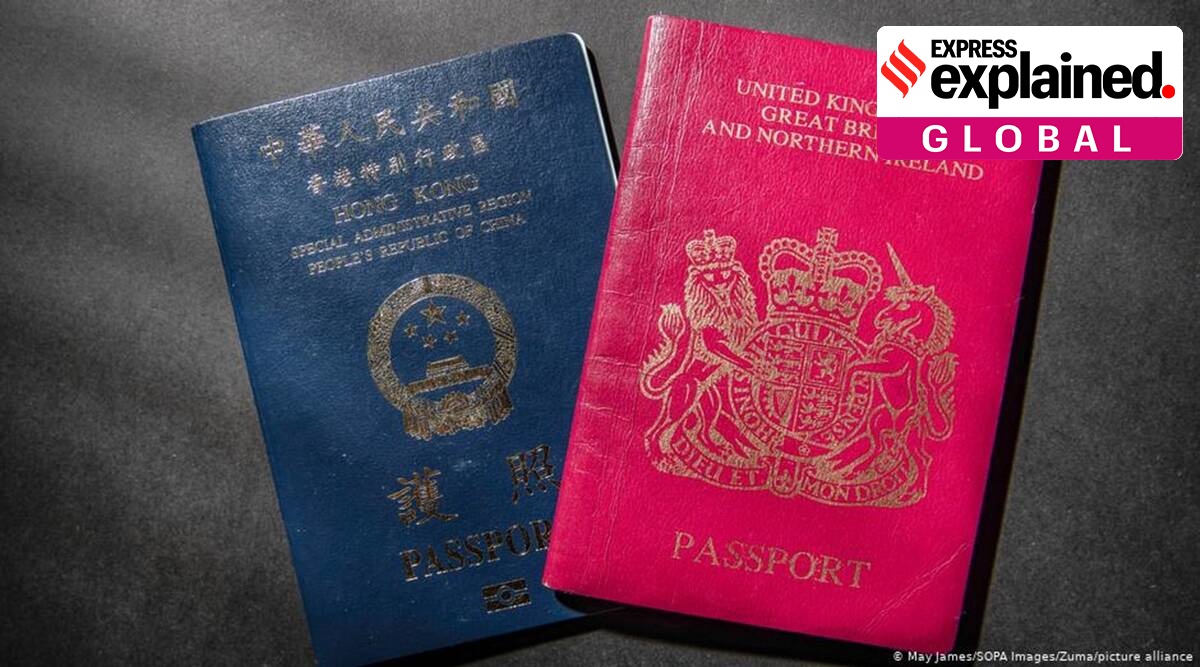Explained: What is the row between China and the UK over passports issued to Hong Kong citizens?

On Thursday, China and the pro-Beijing Hong Kong government told 14 countries to stop accepting the British National (Overseas) passport, which as of early this year can be used by some 3 million Hong Kong citizens to get UK citizenship. Instead, they have asked these states to use the Hong Kong Special Administrative Region (HKSAR) passport. The British government, however, has rejected Hong Kong’s authority to have a say in determining if the BNO passport is valid or not, prolonging the row between the UK and China.
What is this about?
Earlier this year, the British government opened a special visa scheme as part of which Hong Kong residents get a chance to migrate to the UK and eventually apply for citizenship. These visas are issued to those in Hong Kong who hold a BN(O) passport and their immediate dependents, offering them a fast track option to get UK citizenship. Applicants who get the visa can live and work in the UK for 5 years, after which they can apply for settlement. Twelve months after this period lapses, they can apply for citizenship.
The UK’s move to upgrade the provisions of the BN(O) passport holders came after China decided to implement a national security law last year. In May 2020, the UK government said that if China followed through with its controversial national security law that proposed to “improve” Hong Kong’s Basic Law – which is referred to as the mini-constitution which affirms the principle of “one country, two systems” – then the UK government would explore options to allow BN(O)s to apply for leave to stay in the UK, for an extendable period of up to 12 months if eligible. Before this, Hong Kong citizens with BN(O)s had the right to enter the UK for six months as a visitor.
On June 30, 2020, China implemented this law for Hong Kong, giving Beijing greater powers in the city. Under Article 23 of the Basic Law, Hong Kong has to enact a national security law “to prohibit any act of treason, secession, sedition, subversion against the Central People’s Government, or theft of state secrets, to prohibit foreign political organizations or bodies from conducting political activities in the Region, and to prohibit political organisations or bodies of the Region from establishing ties with foreign political organizations or bodies.”
The UK has called China’s decision to implement this law a “grave step” and has maintained that its implementation will restrict the liberties of Hong Kong residents. In fact, UK’s Prime Minister Boris Johnson wrote in The Times early last year that if China implemented the law, “Britain would have no choice but to uphold our profound ties of history and friendship with the people of Hong Kong.”
Hong Kong is a former British colony and was handed over to China in 1997 when it became one of its Special Administrative Regions. Further, the UK also saw China’s move as an attempt to violate the 1984 Sino-British Joint Declaration, under which China promised to honour Hong Kong’s liberal policies, a system of governance, an independent judiciary, and individual freedoms for a period of 50 years from 1997.
So, what is the British National Overseas Passport?
According to an article in The South China Morning Post, the BN(O) was first issued in 1987, 10 years before the return of sovereignty over Hong Kong from Britain to China. The document replaced the British Dependent Territories citizens’ passport. Anyone who was a British Overseas Territories Citizen (BOTC) by connection with Hong Kong was able to register as a British national (overseas) before July 1, 1997.
Further, a BOCT from Hong Kong who did not register as British nationals (overseas) and had no other nationality or citizenship on June 30, 1997 became British overseas citizens on July 1, 1997. Essentially, these passports are issued to those born in Hong Kong before the 1997 handover.

“평생 사상가. 웹 광신자. 좀비 중독자. 커뮤니케이터. 창조자. 프리랜서 여행 애호가.”
